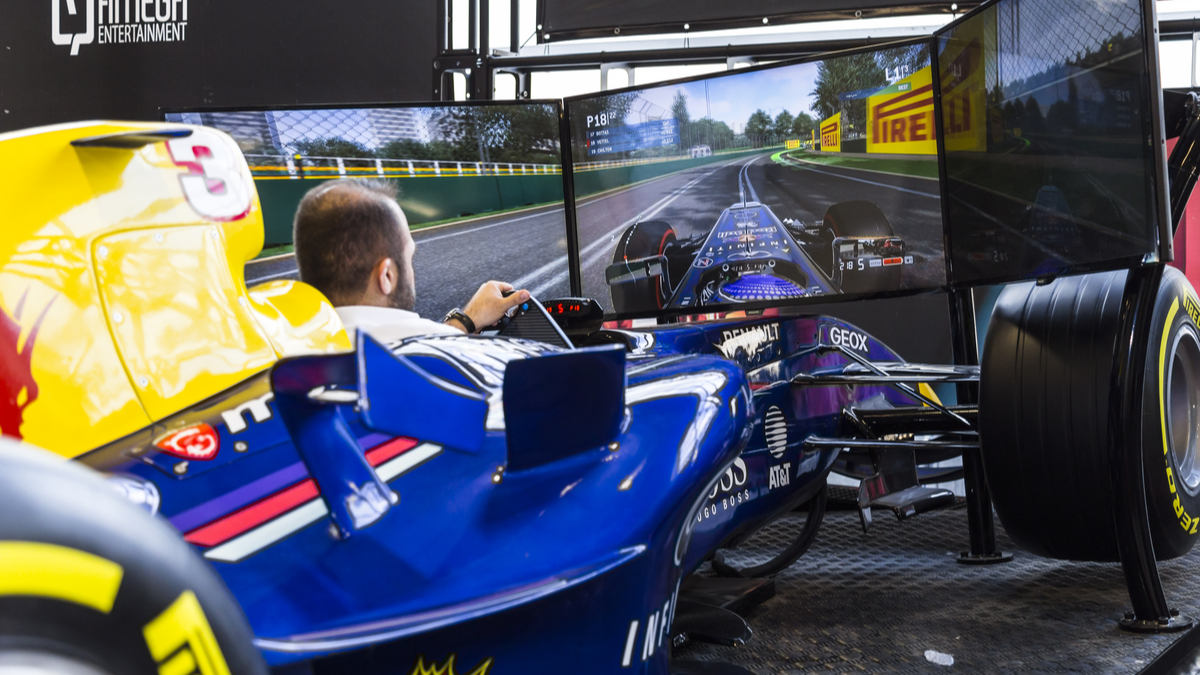
- Electronic sports is one of the fastest-growing entertainment industries, swelling to a value of almost $1 billion as it attracts a young demographic of fans.
- It an important area of focus for Formula 1, which is looking to capitalise on interest in virtual gaming and competition.
F1 had not stepped into the esports arena before Liberty Media’s takeover in January 2017. Fans looking to race together had to make do with unofficial leagues organised online, but that all changed last autumn when F1 launched its esports series.
The attraction to a broad and committed younger generation of F1 and esport fans is something that we are proud to support and nurture
Drivers were invited to take part in online qualifiers using the official F1 video game before the top 40 met in London for the live semi-finals. This was whittled down to 20 drivers for the live finals at the season-ending Abu Dhabi Grand Prix, where the races were broadcast online and given a full TV presentation similar to that of the real-life F1 events. The winning driver – 18-year-old Brendon Leigh, a kitchen manager from Reading – was awarded the trophy on the podium in Abu Dhabi just hours before the final grand prix of the season.
“The attraction to a broad and committed younger generation of F1 and esport fans is something that we are proud to support and nurture,†F1 commercial chief Sean Bratches said following the live final. “We look forward to establishing a season-long series in 2018.â€
Liberty has been pushing to make F1 more attractive to a younger audience since its takeover, and esports offers a straightforward way to do that. A report from analytics provider Nielsen Sports found that the average age of esports fans is 26. And among those in its sample from the UK and Germany – two of F1’s most important markets – motorsports is the third most popular sport.
Nielsen reports that esports fans consume around 3.5 hours of digital/streaming content each week, and spend 4.5 hours watching videos online through websites such as YouTube. F1 recently launched its F1 TV platform, which looks to take the sport to a new, younger audience that would not watch the sport on mainstream TV. The crossover with the esports demographic makes it an obvious point of interest for F1.
I think there’s no doubt that F1 gaming, and specifically videos of it on YouTube, helps the real-life sport gain new followers
Enthusiasm for esports is also bringing fans to F1 who might not otherwise have tuned in. “I think there’s no doubt that F1 gaming, and specifically videos of it on YouTube, helps the real-life sport gain new followers,†said Aarav Amin, a leading F1 gaming content creator on YouTube whose videos have amassed more than 65 million views.
“From personal experience, I’ve seen comments from viewers countless times expressing how they’ve become new fans of the sport and are now obsessed with it thanks to watching my videos. These viewers are typically either teenagers or young adults, which is exactly the type of audience Liberty Media has been wanting to engage.â€
Esports is also creating opportunities for drivers. Motorsport is traditionally a very expensive pastime, and young drivers require huge financial support to even get close to F1. As video games and simulations have improved, the gulf between the virtual and the real world has shrunk, giving gamers a chance to get a foot on the motorsport ladder.
The McLaren F1 team staged a ‘World’s Fastest Gamer’ competition last year to find a new simulator driver, testing gamers through a series of virtual and physical challenges. The event was won by Holland’s Rudy van Buren, who is now officially part of the McLaren team, working with race drivers Fernando Alonso and Stoffel Vandoorne to help develop the real-world F1 car.
Van Buren said: “Every boy that starts karting dreams about F1, and at a certain point that dream just vanishes. Now by winning World’s Fastest Gamer, I can relive that dream. It really was the toughest job interview I ever faced, but with such an incredible reward at the end of it.â€
Van Buren and F1 esports winner Leigh were both given a berth in the ‘Race of Champions’ event in January that pits drivers from a variety of racing series in a head-to-head challenge. Leigh had never driven a real-life car until the week leading up to the showcase, but was able to get up to speed and underwent an intensive fitness regime similar to that of professional drivers, completing the transition from gamer to racer.
The esports effect on F1 is greater than simply offering a younger, previously untapped audience to the series. It is also makes motorsport more accessible and opens doors to aspiring racers.
Four-time world champion Lewis Hamilton is not convinced we will see future F1 drivers starting out in esports, but having come from a poorer background himself, he recognises the value of it and the opportunities it might create.
 I’ve got fans who are good at gaming but when they got into the car it isn’t the same
“It is quite incredible, the recent developments,†Hamilton said. “But do I think that will translate into a racing driver? Honestly, I don’t think you can ever be sure, but I doubt it. I’ve got fans who are good at gaming but when they got into the car it isn’t the same.
“It would be a far more feasible career for many because right now racing is so expensive and if [esports creates] an opportunity in the future, then that’s good for people that come from places that I came from. They can’t get that now. It is much harder for anyone from a council estate in Stevenage to get to F1 now – pretty much impossible because you need a lot of money.â€
As F1 begins to map out its digital future, esports is going to be a key part of its plan – and it could have a significant impact both on and off-track.
Tags: #smallcapstocks, $TSXV, CSE, egaming, esports, F1, gaming